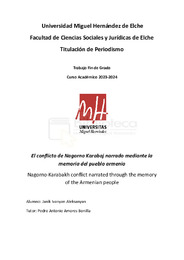Por favor, use este identificador para citar o enlazar este ítem:
https://hdl.handle.net/11000/33348Registro completo de metadatos
| Campo DC | Valor | Lengua/Idioma |
|---|---|---|
| dc.contributor.advisor | Amores Bonilla, Pedro Antonio | - |
| dc.contributor.author | Ivanyan Aleksanyan, Janik | - |
| dc.contributor.other | Departamentos de la UMH::Ciencias Sociales y Humanas | es_ES |
| dc.date.accessioned | 2024-09-30T15:12:20Z | - |
| dc.date.available | 2024-09-30T15:12:20Z | - |
| dc.date.created | 2024-06 | - |
| dc.identifier.uri | https://hdl.handle.net/11000/33348 | - |
| dc.description.abstract | La guerra de Nagorno Karabaj en 2020 ha vuelto a enfrentar a la República de Azerbaiyán con la República de Armenia, dándose por el bando azerí en repetidas ocasiones múltiples crímenes de guerra y otras prácticas que atentan contra los derechos humanos, algunos actos incluso condenados por la Corte Internacional de Justicia en 2023. Este conflicto latente desde su explosión en 1988 tiene en su historial una gran carga geopolítica, radicando uno de los principales problemas en las consecuencias de la toma de decisiones por los dirigentes de la Unión Soviética en la delimitación de las fronteras armenias y azerís y la posterior determinación independentista del pueblo de mayoría armenia de la región de Nagorno Karabakh, también denominado Artsaj. Esta investigación tratará de hacer un repaso histórico desde una posición posmoderna, donde se ponga el foco en la memoria popular como elemento clave de la narrativa de los perdedores, los oprimidos y los sinvoz. Además, se realizará un estudio de las identidades disidentes en la sociedad armenia, su gran diáspora repartida por todo el mundo y el constructo del Estado armenio reciente, como un territorio transfronterizo, donde la diáspora, provocada por el Genocidio armenio de 1915, tiene un papel crucial actualmente. Mediante un enfoque periodístico, motivado por la escasa cobertura mediática durante la guerra del Alto Karabaj de 2020, se aplicará la memoria oral para construir un relato alternativo a la corriente historicista oficial donde se lleva a cabo una narrativa de vencedores y vencidos y conseguir de esta forma contar los conflictos que enfrenta Armenia desde una perspectiva más humanística. | es_ES |
| dc.description.abstract | The Nagorno Karabakh war in 2020 has once again pitted the Republic of Azerbaijan against the Republic of Armenia, with the Azeri side repeatedly committing multiple war crimes and other practices that violate human rights, some acts even condemned by the International Court of Justice in 2023. This latent conflict since its explosion in 1988 has a great geopolitical charge in its history, one of the main problems being the consequences of the decision-making by the leaders of the Soviet Union in the delimitation of the Armenian and Azerbaijani borders and the subsequent independence determination of the Armenian-majority people of the Nagorno Karabakh region, also called Artsakh. This research will try to make a historical review from a postmodern position, where the focus is placed on popular memory as a key element of the narrative of the losers, the oppressed and the voiceless. In addition, a study will be carried out on dissident identities in Armenian society, its large diaspora spread throughout the world and the construction of the recent Armenian State, as a cross-border territory, where the diaspora, caused by the 1915 Armenian Genocide, has a crucial role today. Through a journalistic approach, motivated by the scarce media coverage of the Nagorno Karabakh war of 2020, oral memory will be applied to build an alternative story to the official historicist current where a narrative of winners and losers is carried out and thus achieve tell the conflicts facing Armenia from a more humanistic perspective. | es_ES |
| dc.format | application/pdf | es_ES |
| dc.format.extent | 77 | es_ES |
| dc.language.iso | spa | es_ES |
| dc.publisher | Universidad Miguel Hernández de Elche | es_ES |
| dc.rights | info:eu-repo/semantics/openAccess | es_ES |
| dc.rights | Attribution-NonCommercial-NoDerivatives 4.0 Internacional | * |
| dc.rights.uri | http://creativecommons.org/licenses/by-nc-nd/4.0/ | * |
| dc.subject | Armenia | es_ES |
| dc.subject | geopolítica | es_ES |
| dc.subject | guerra | es_ES |
| dc.subject | memoria | es_ES |
| dc.subject | Artsaj | es_ES |
| dc.subject | geopolitics | es_ES |
| dc.subject | war | es_ES |
| dc.subject | memory | es_ES |
| dc.subject.other | CDU::0 - Generalidades.::070 - Periódicos. Prensa. Periodismo. Ciencias de la información | es_ES |
| dc.title | El conflicto de Nagorno Karabaj narrado mediante la memoria del pueblo armenio | es_ES |
| dc.title.alternative | Nagorno-Karabakh conflict narrated through the memory of the Armenian people | es_ES |
| dc.type | info:eu-repo/semantics/bachelorThesis | es_ES |

Ver/Abrir:
PER_TFG_IVANYAN_ALEKSANYAN_JANIK.pdf
3,61 MB
Adobe PDF
Compartir:
 La licencia se describe como: Atribución-NonComercial-NoDerivada 4.0 Internacional.
La licencia se describe como: Atribución-NonComercial-NoDerivada 4.0 Internacional.
.png)